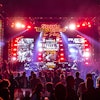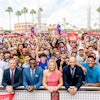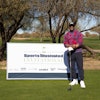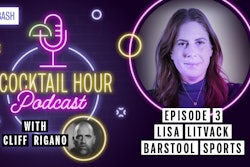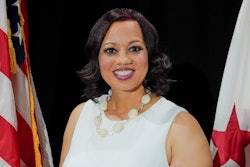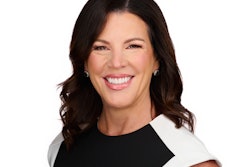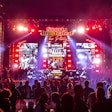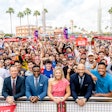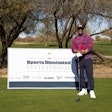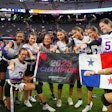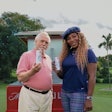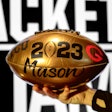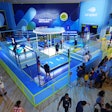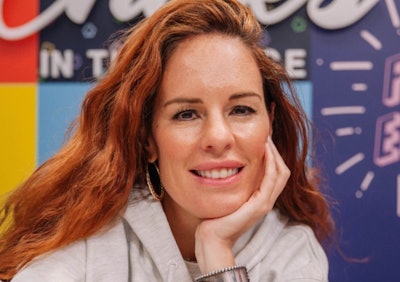
Beyond a blog site and digital media company, Barstool Sports has become a cornerstone of pop culture thanks to its 94 different shows and 110 personalities.
With an audience in the hundreds of millions, it’s no wonder “one bite, everybody knows the rules” has become a widely used catchphrase beyond Dave Portnoy’s Pizza Reviews, where the Barstool founder takes to YouTube for daily videos ranking his favorite slices (there’s even a site to track his ratings called One Bite). And Pardon My Take, a comedic sports podcast with a title that plays on ESPN’s Pardon the Interruption and First Take, is consistently ranked No. 1 on podcasting platforms as its host, Dan “Big Cat” Katz, has shot to stardom.
Chicks in the Office, the pop culture-, entertainment-, and celebrity-centered podcast hosted by Ria and Fran, meanwhile, sells out theaters in minutes when it releases tickets to its live tapings.
It’s a level of success that Barstool wasn’t always used to. Since 2016, when Erika Ayers was named the first chief executive officer of Barstool Sports, it has grown its staff “from 12 to 400-plus people,” and its revenue “from $5 million to $250 million,” Ayers said in an interview with BizBash at Barstool’s New York headquarters, which fans have often seen in the background of its video content.
During that same time seven years ago, “no one would take a meeting with me,” Ayers recalled, adding that in her early days working at Barstool, she was “working out of coffee shops and Dave’s apartment.”  Barstool Sports was founded in 2003 by Dave Portnoy (pictured), who's also lovingly known as "Stool Presidente."Photo: Courtesy of Barstool Sports
Barstool Sports was founded in 2003 by Dave Portnoy (pictured), who's also lovingly known as "Stool Presidente."Photo: Courtesy of Barstool Sports
“Anyone who took a meeting with me when I was a CMO of AOL would not take a meeting with me at Barstool Sports,” she added. But following the completion of a $388 million acquisition by Penn Entertainment this past February, those days seem a lifetime away. Now, aside from the chokehold Barstool has on the digital space, the brand is taking the live events space by storm with its reality television-type culture its fans know and love. “An event is such a powerful way to make an impression on someone,” Ayers said, pointing to the incredible ways IRL can “make people feel something.”
However, “no one is waiting to be pushed a brand message,” the CEO said, adding that “if someone’s taking something from your event, or going to your event because something’s free, you’ve lost.”
Keep reading to hear more from Ayers, including her own career journey, how Barstool has evolved over the course of her seven years at the company, and what role events—and the event partners that come with them—play for the ultra-popular brand…
How has Barstool changed since you joined the team?
When I got to Barstool, there were probably 15 people. They blogged every 30 minutes. And that's really what they knew how to do. They were afraid of Dave, and they had their blog.
And I was like, “Alright, this is great.” I loved the blog, but to grow, I was worried about payroll.
They didn't have a PnL. There wasn't an office. So the idea that we were going to grow is we had to move outside of the blog format. And I was lucky because that summer, there were a bunch of things that happened that year—2016 was such a crazy year. One, Facebook launched Facebook Live, and Twitter bought Periscope. And so it was easy. It didn't cost me a lot of money to turn the cameras on, and to put the same guys who were blogging in front of a camera for long periods of time.
No one would take a meeting with me. So the summer that I joined Barstool I was working out of coffee shops and Dave's apartment. Anyone who would take a meeting with me when I was a CMO of AOL would not take a meeting with me at Barstool Sports. So the only choice I had was to show people.
I was like, “Alright, fine, like nobody's going to take a meaning,” so we would go live on Facebook Live. And I remember one night, we went live on Facebook Live, and we were talking about the seating chart—because I created a seating chart for where everyone was going to sit in the office, and it created a huge amount of drama. We crashed Facebook Live. And then we moved all the fans to Periscope. And then Periscope crashed because it was new technology. And then we moved everyone back, and we didn't lose any audience.
It kind of woke up the platforms because they're like, “What is this brand that is doing this thing and having this level of heat and this level of audience?” So it opened the door to creating a bunch of meetings. And then obviously, we moved into podcasting—we've moved into all different formats—and we've grown from 12 people to 400-plus people, we've gone from $5 million in revenue to $250 million in revenue. We've had this crazy growth.
Penn Entertainment bought a 36% stake in 2020. And then they've just completed the 100% acquisition. Now they own all of us, which is awesome. It’s like a dream come true for us. Ayers described Barstool as "an IP company." That company boasts an impressive 94 shows made possible by 110 personalities, including a blog.Photo: Courtesy of Barstool Sports
Ayers described Barstool as "an IP company." That company boasts an impressive 94 shows made possible by 110 personalities, including a blog.Photo: Courtesy of Barstool Sports
How do you keep track of all of Barstool’s content channels—and ensure that each one is getting the same amount of love?
We have a lot of content. We have about 110 personalities. We have 94 shows that we own and operate. At our core, we're really an IP company. What we're really, really, really good at is finding people who are funny or opinionated or charismatic or entertaining on the internet. We give them a huge amount of creativity and autonomy. Come in, you get a phone, you get a camera, you get a computer, you get access to the blog, and it's like, let's see what you can make, which is very rare.
When you think about the media business, most people come in very constrained. You're hired for a particular scope, or you're hired for a particular show, or you're assigned to a particular desk or a particular role. We're not like that. We say, “Hey, come in. Let's see what you can do.”
The other thing that's really different about us is that yes, we have 94 different shows and 110 personalities, but they're all woven with each other, which is a really organic way to create cross pollination and cross collaboration and to find new audiences. When we do livestreams, we bring all the talent and personalities together. And the reason that's unique is—look at most media companies. Bomani Jones is like “I'm on this show on ESPN,” or “I'm hosting this show.” And we just don't believe in that. We're like, “Hey, come in, make content, be funny, be relevant, take the moment when it shows up.” We never know when that's going to happen. And as a result, we've created a very different type of media company. And we've also done it on really low costs.
The other piece is that we really let people be themselves. We really believe in authenticity. If you feel like being funny, be funny. If you're mad, you should be mad. The camera should always be on. And that's how we look at it.
How do events come into play at Barstool? What role do they have at the company?
I think an event is such a powerful way to make an impression on someone. An event—it's a really incredible way to make people feel something. You don't feel something from looking at a banner ad or you don't feel something from listening to an ad on a podcast, but when you're immersed in someone's color and sound and motion and words and audio—it's just a far more immersive experience.
I think that the events business has really changed. And I love events. I'm not an internet person, so I'm attracted to physical things. But I think the more event professionals can think about internet experiences—the juxtaposition of the two is really interesting.
We do a lot of events, we have an amateur boxing brand called Rough N’ Rowdy. We do live shows where we'll do Chicks in the Office live, and we'll sell it out in minutes. Or we have a Super Bowl party every year. And that's a big experience for us. So we do all different types of events. But I think event marketing—the idea of bringing your fans together in one place and making a statement—has far longer and lasting staying power. Chicks in the Office does live tapings, which sell out in minutes. "An event—it's a really incredible way to make people feel something," Ayres said.Photo: Courtesy of Barstool Sports
Chicks in the Office does live tapings, which sell out in minutes. "An event—it's a really incredible way to make people feel something," Ayres said.Photo: Courtesy of Barstool Sports
What do you look for in an event partner?
In an event partner, you want a couple of things. One is you want someone with vision—someone who can take your blurb of “This is what we want to do. This is what we want to be.” You want someone who can poke holes in it, challenge it, but also take it to a new place. I think there's a real genius in event marketing. Great event marketing is very, very smart. I think most event marketers are not smart. And so the ones that are really smart, it really shows.
There's a higher level of thinking around an event because you're not just trying to say something or show something, you're trying to make someone feel something. I think great event marketers can create the vision of how you make people feel and how you create a lasting impression.
I also think you have to be—at least in our case—you have to have thick skin. We're a company that knows exactly who we are. And we don't buy into a lot of B.S. I don't like marketing fluff. I hate when people come in here and pitch marketing fluff. And sometimes, I think in an event company, it's more fluff than substance. So I think great event marketing companies have real substance. And then you just have to have speed and execution. The greatest event professionals in the world are people who just magically figure stuff out. They’re producers at their core. Something's going to go wrong or something's gonna break or the weather—whatever it is, they're great problem solvers.
I also think brands can be very delusional, and brand marketers can be too tactical or too safe in that nobody is waiting to be pushed a brand message. Nobody needs another cheap t-shirt with a corporate logo on it. Nobody wants another water bottle. Yeah, you might want the water bottle because it's free. But if someone's taking something from your event, or going to your event because something's free, you've lost.
I think that the greatest events are events where you want something because it says something about yourself. And that, to me, is what makes a great event partner, whether it's a B2B or B2C event. "I think that the greatest events are events where you want something because it says something about yourself. And that, to me, is what makes a great event partner, whether it's a B2B or B2C event," Ayres said.Photo: Courtesy of Barstool Sports
"I think that the greatest events are events where you want something because it says something about yourself. And that, to me, is what makes a great event partner, whether it's a B2B or B2C event," Ayres said.Photo: Courtesy of Barstool Sports
Tell us about your own career journey.
I’ve been at Barstool for seven years, which is crazy. Longest job I’ve ever had. I started my career, and I thought I wanted to be a lawyer. So I worked at Fidelity Investments—I worked in their legal department—and I hated it. I was very bored. And I didn't like that someone's whole job would be that you mitigate risk. And it was all about saying no to things, which is a good thing that lawyers do.
I left the legal group at Fidelity and then went to work in the ad department. The HR people at Fidelity were like, “You're a f**king idiot. Why would you? Why would you ever do this, you're being such an idiot.” I went from making $50,000 to $17,000. And at Fidelity, the culture was all about making money—the whole business is about making money. And it was just very shocking to them.
Long story short, I moved to the ad group, the internet was just starting, and nobody wanted to work on the internet. Everyone wanted to work in print and broadcasting. And I started as a media buyer. So, I bought print, I bought television, I bought broadcast, I bought cable. And then I started buying a lot of interactive, and this was, you know, in 1999. I paid $30 million for keyword Fidelity on AOL, with zero tracking. It was just really early, early days of interactive. But I loved it. I thought it was so creative, that it was kind of like the Wild West, that there was going to be so much opportunity. There was so much that was unknown.
My first real big break was when I went to work for Microsoft in 2001. I worked abroad building their global branded entertainment—really figuring out how brands could use the internet and how publishers and technology companies could get brands to underwrite things to create content experiences for people. I loved it, then went to Yahoo—was the CMO of AOL.
And then I took another big jump. I left the CMO job at AOL to go launch a music startup working with Scooter Braun and Justin Bieber. And I modeled it on Barstool Sports. So I was a big Barstool Sports fan. I had lived in Boston forever. I lived in Boston when Dave used to hand out the paper at the T station. And what I loved about it was the site was a piece of sh*t, the app didn't work, there were grammatical and spelling errors everywhere. But if you were a fan of something, you really felt something.
For me, I love the Patriots. And when I finished reading Dave's blog on Deflategate [the NFL controversy from 2015 where then-Patriots quarterback Tom Brady was accused of deflating footballs used in the team’s win against the Indianapolis Colts at the AFC Championship Game], I bought five “Free Brady” t-shirts. That's what I wanted Justin Bieber to do with the Purpose Tour—the idea that you love the Purpose album, and you want to wear the commerce. It badges you with the brand. So I modeled a lot of the startup on Barstool and then, really out of the blue, the Chernin Group put a majority investment in Barstool. This was in 2016. So it was December 2015, and I saw the Chernin Group had made a majority investment. And I was so jealous. I wanted that job.
I thought, “They're gonna find some white guy with an MBA who works in sports,” and I begged pretty much anyone I knew to get me an introduction with Dave. And finally, a friend of mine who was a former CEO of HuffPost was like, “Alright, get me off her back. I’ll get you a coffee with Dave.”
And I was late. And I met Dave in a coffee shop in the West Village, and we just totally hit it off and talked about commerce, talked about the brand, talked about what Barstool could be. I was probably the 70th candidate that they had been through. So they had been through all the white guys with the MBAs and the button-down shirts, and I think they were getting a little bit desperate to find someone who understood the brand and who could grow the business. I've been working here since that day, that was probably in March or April 2016. And that's how I got here. It's been a wild ride ever since.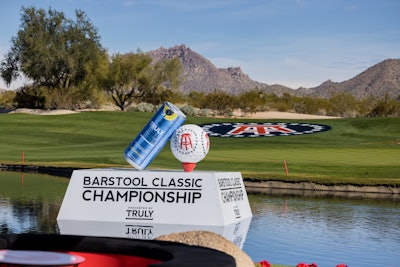 Barstool has a slew of live events, including the Barstool Classic Championship. The 2023 season of the golf tournament marks the competition's fifth season. Throughout April, events will take place in Louisiana, Arizona, and California before making its way to the East Coast and Canada.Photo: Courtesy of Barstool Sports
Barstool has a slew of live events, including the Barstool Classic Championship. The 2023 season of the golf tournament marks the competition's fifth season. Throughout April, events will take place in Louisiana, Arizona, and California before making its way to the East Coast and Canada.Photo: Courtesy of Barstool Sports
How have you built a good team around you at Barstool?
It's just chemistry. A lot of it is chemistry.
You have to bring in great players. You need people who know what they're doing. I don't really care about pedigree. I don't care where anybody went to college. I don't really care where you worked before this. Most likely, I'm not going to remember either one of those things.
What I do care about is what do you have to offer us? And how convicted are you about what you know? [Knowing] your sh*t is really, really important to me. The second thing is, are you a maniac about it? I like maniacs. I really care, whether it's a B2B marketing professional, or the press, or a technical person, or an engineer…I really like people who are always wanting to better themselves. So those are the best people here. Those are the best people on our team.
Also—have a lot of empathy. Don't bring a lot of ego. I hate insecurity. Insecure people drive me nuts. I think insecure people are really, really toxic. So we don't have a lot of that. I don't like hierarchy. I don't really like politics. And I've always felt this, but at Barstool it was really true—I had to make payroll. Every month, it was hand to mouth at this place. I had to make enough money so that I could pay everyone every month. And that kind of stuck. So my thing is, I don't like inertia. I think if you have inertia on your team, it's a cancer. I think every environment is relentless. The environment you create around you—negative or positive or complacent or ambitious—is really relentless. It just seeps into you. So I really like an environment that doesn't have much stagnation—that is really like always, always moving.
What is your leadership style like?
I have a lot of energy. I'm very intense. I have so much love. I'm all heart. I care so much about what we do here, and how we do it, and who we do it for. I care a lot.
I think I'm always moving the goal post, which I think can be frustrating. I just always want to push; I always want to push further. And I'm impatient about pushing. Direct. Very direct. I'm fast. I want to move all the time. I am very curious. I always want to learn. I don't like being managed. I want to always be next to the person who has the idea or who's doing the thing. I like really smart, collaborative people. I love people who fail all the time. I love people who try things. And then I'm just really passionate. I really believe in our team. Barstool has a partnership with Hooters, and aside from receiving discounts for being a "Stoolie," Barstool fans can attend events—like live wing-eating competitions—to see the alliance in action.Photo: Courtesy of Barstool Sports
Barstool has a partnership with Hooters, and aside from receiving discounts for being a "Stoolie," Barstool fans can attend events—like live wing-eating competitions—to see the alliance in action.Photo: Courtesy of Barstool Sports
What has made Barstool such a success over the past 20 years? And what’s next for the company?
I think what's cool about Barstool is that you just never really know what's going to happen. And it is a business, but it's also a reality show. It just makes you sit up straight. It's like a jolt of electricity.
For me, it was my first CEO job—I'd never had a CEO job—I had no idea what the f**k I was doing. And now, I think I could run almost anything after this experience. There's something about this place—it's like dog years where seven years is 70 years. So our best people who think about our business are really gunning for a shortcut. They've taken a risk in coming here, they want to accomplish something—we don't have a lot of hierarchy, we don't have a lot of bureaucracy—so you can come here, and I'll give you as much as you can possibly take. It’s probably a strength and a weakness in my management style. I like to give people more and more and more and more and more. I think a lot of companies have people who just want to hide and they're like, “I'm good, I want to leave at five o'clock and not think about my job after I go home.” And I respect that, but those people last six seconds here.
Our personalities want their time in the sun. Our best people and best personalities—we've gotten them from really random places. But the best ones—when someone thinks about the Mets, for example, our crew wants them to think about them. We want people who want to be synonymous with one thing. Dave Portnoy—synonymous with pizza. Dan Katz—synonymous with football. Chicks in the Office—synonymous with entertainment. And I think that keeps people really motivated because the internet is always moving. It never stops. So if you want to be the girl who's known for the thing, whenever the thing happens, you have to be there. And that takes a lot of sacrifice. And that weeds out a lot of people on the talent side, because look, it's annoying, but sports and entertainment happen at night and on the weekends.
Our culture is always on because the internet is always on. And I think that's a big part of this DNA.
This interview has been edited and condensed.

